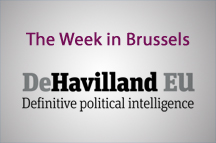 A year after LuxLeaks, what has been achieved?
A year after LuxLeaks, what has been achieved?
This week saw two milestones in the EU's response to last year's 'LuxLeaks' tax revelations: MEPs on the Special Committee on Tax Rulings finalised their recommendations for action, while the European Parliament as a whole adopted its position on the first legislation of the EU's Action Plan on Corporate Taxation.
A rocky start for the European Commission
The current European Commission had been in office for a matter of days before it faced its first scandal. 'LuxLeaks' saw a number of documents released with details of preferential tax rulings in Luxembourg – many dating to a time when Jean-Claude Juncker was Prime Minister. Mr Juncker, newly appointed Commission President, therefore found himself facing a motion of censure in his first month in the job. And if this appointment seems like unfortunate timing, then the fact the Luxembourg is currently holding the Council Presidency is surely doubly so.
The resulting debate in Brussels has arguably produced more heat than light, but there is no doubt that the issue of corporate taxation has forced itself to the top of the EU agenda, and one year into the Juncker Commission, it is interesting to see what progress has been made.
Tax: a matter for Member States
 The first thing to be noted is that taxation is a competence fiercely guarded by Member States, imposing severe constraints on what can be done at EU level. The Commission's role has largely been to enable the exchange of information, and to cement rules agreed in international fora such as the G20 and the OECD. Nonetheless it clearly felt compelled to introduce new legislation in a timely fashion, dealing with tax rulings and transparency between Member States. This has been swiftly agreed by national governments, despite a protest opinion from lead MEP Markus Ferber, who feels countries "have not kept their promises" on transparency.
The first thing to be noted is that taxation is a competence fiercely guarded by Member States, imposing severe constraints on what can be done at EU level. The Commission's role has largely been to enable the exchange of information, and to cement rules agreed in international fora such as the G20 and the OECD. Nonetheless it clearly felt compelled to introduce new legislation in a timely fashion, dealing with tax rulings and transparency between Member States. This has been swiftly agreed by national governments, despite a protest opinion from lead MEP Markus Ferber, who feels countries "have not kept their promises" on transparency.
Next year the Commission's 'Action Plan on Corporate Taxation' will go a step further in attempting to introduce a mandatory Common Consolidated Corporate Tax Base (CCCTB), as confirmed in the Work Programme for 2016 (for more on the Commission's legislative agenda for next year, download our briefing).
But as tax law remains relatively ring-fenced, the EU executive is also approaching the problem from other angles. The energetic Commissioner for Competition, Margrethe Vestager, who has been unafraid to launch investigations into companies from Google to Gazprom, has turned her attention to tax rulings. In the first (but likely not last) judgement announced this month, the Commission ruled that Fiat and Starbucks must pay back between €20 and €30 million to Luxembourg and the Netherlands respectively, due to tax rulings deemed "illegal" under EU state aid law. But it almost goes without saying that there is a limit to what can be achieved through such methods, and Ms Vestager was quick to underline that she does not want to become the EU's "tax chief".
Frustration for MEPs
Where the Commission has been active, the Parliament has been hyperactive – despite (or perhaps because of) being even less able to affect the situation. A Special Committee on Tax Rulings (TAXE) was promptly set up to investigate both Member States and multinationals. The Parliament as a whole will next month vote on its (non-binding) recommendations, but its more visible legacy has been MEPs' grilling of finance ministers and corporate tax chiefs.
This is not enough for several MEPs who, frustrated by restricted access to Member States' documents, are demanding that the Special Committee's mandate be extended.
Where next?
The Commission has promised a mandatory CCCTB in 2016, a proposal which will surely test its power to the limit, in the face of opposition from Member States like the UK.
Meanwhile the TAXE Committee will meet on the 16th of November for its swansong, which representatives from Google, Facebook, HSBC and Barclays on the menu.
Ultimately though, while the Parliament can sway the debate, and the Commission can act as an enabler and enforcer, it will be down to Member States to fix a broken corporate tax system, as it always has been.
For more news on taxation, and on financial services policy in general, sign up for our Open Content Week from the 9th to the 13th of November.














